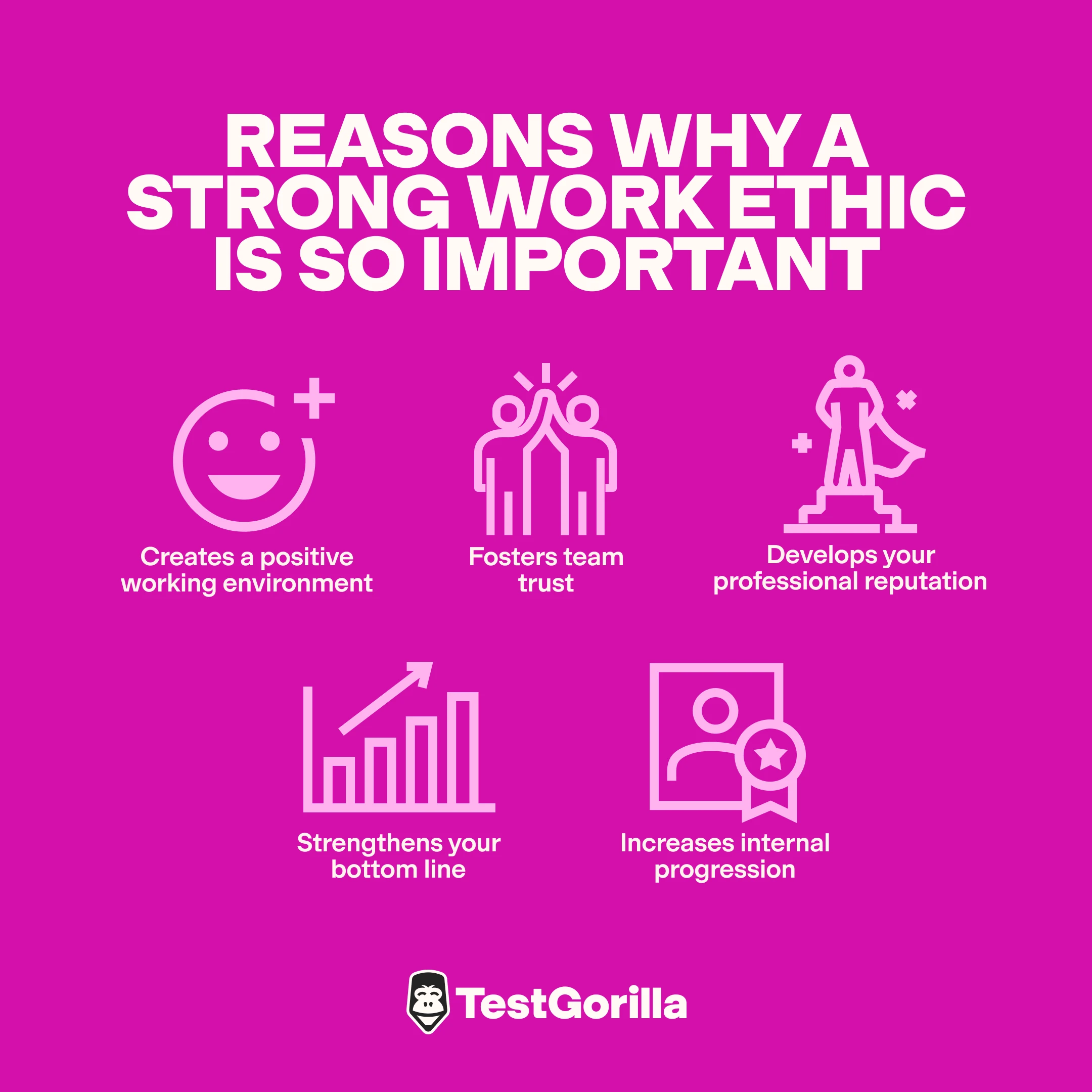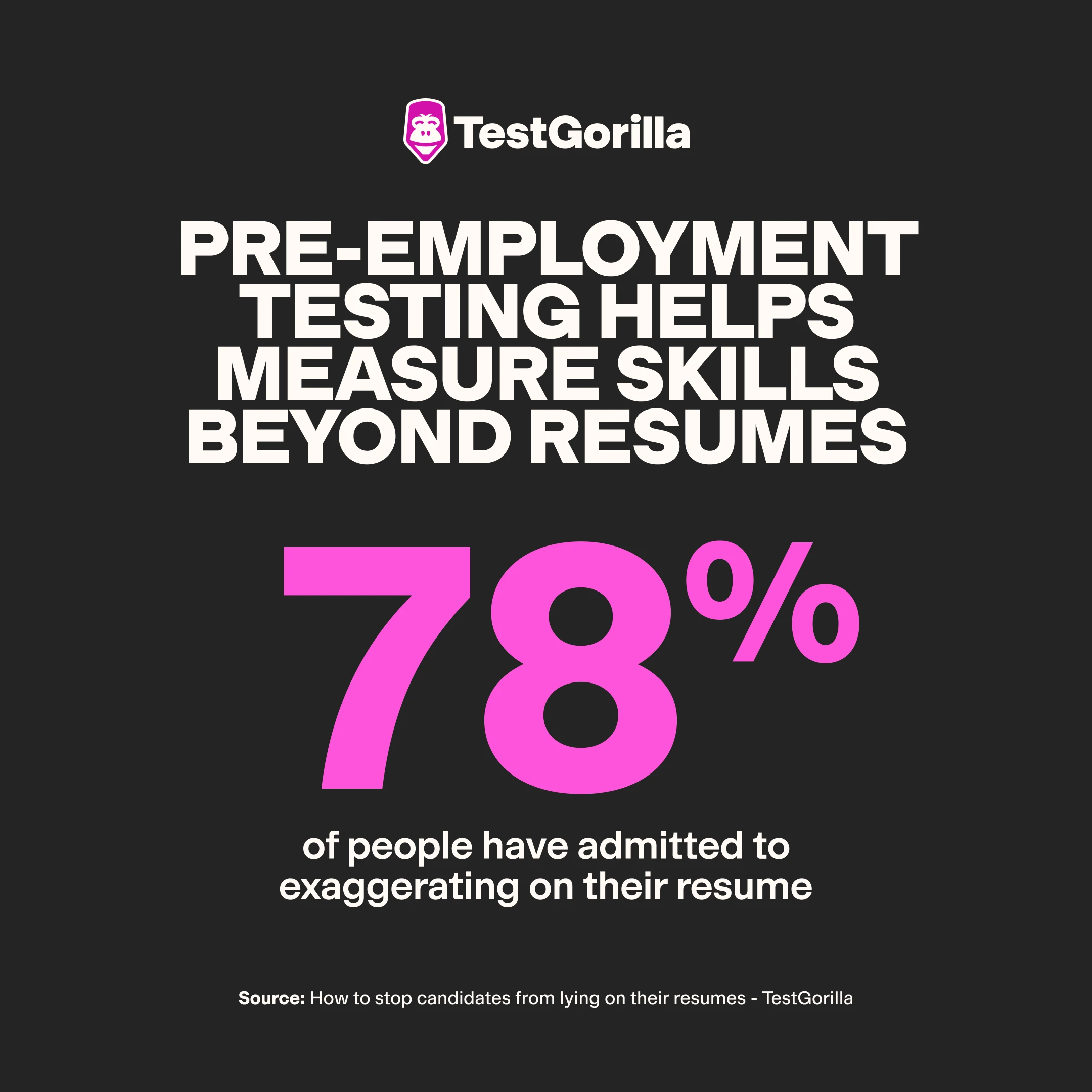Measuring worth ethic can be tough. There’s no scale, grade, or test that you can assign to measure whether someone is a hard-working superstar or a sleepy slacker. So how will you know if a candidate actually has what it takes to keep up with your high-performing team or are just good at selling themselves?
Work ethic is a key behavioral competency, and can be evaluated in a variety of ways including pre-employment testing, asking strategic interview questions, and examining samples of work. We’ll also look at what a strong work ethic is and why it’s important. Let’s get started!
What is a strong work ethic?
A strong work ethic is an intrinsic motivation that compels an employee to work hard and to the best of their ability. Employees with a strong work ethic show up on time, are reliable, and demonstrate perseverance even in challenging situations. They’ll complete tasks quickly and go above and beyond what’s required to deliver excellence. This makes them great to have on your team.
The importance of a work ethic
Hiring a team with a great work ethic is key to the success of your business. For example, a strong work ethic will:
Create a positive working environment. Who doesn’t want to work in a high-performing, successful team? Hiring a team with a good work ethic ensures your team is consistently engaged and doing their best work. This will lead to a positive working environment and a collaborative atmosphere.
Foster team trust. Consistently working in a collaborative atmosphere generates trust among your team and strengthens relationships. This mutual support system encourages team members to rely on one another, share ideas, and tackle challenges together, leading to a more cohesive and resilient team.
Develop your professional reputation. Having a great team under you means you’ll consistently produce great work. Day by day, this grows your professional reputation, showcasing your business as reliable, competent, and innovative. A strong reputation attracts more clients, partners, and top talent, leading to a cycle of success.
Strengthen your bottom line. Having a positive working environment, a strong team, and a great professional reputation will ultimately lead to increased profitability. A strong work ethic means your team will be more efficient and productive, leading to better results, less turnover, and an enhanced bottom line.
Increases internal progression. Employees with a strong work ethic are more likely to seek out opportunities for learning and development within your business. This in turn will make them better candidates for promotion, meaning you can save money on external recruitment campaigns by promoting from the inside.
The best insights on HR and recruitment, delivered to your inbox.
Biweekly updates. No spam. Unsubscribe any time.
Interview questions to assess strong work ethic
As work ethic is an intrinsic motivation, it can be tricky to measure. But try asking the following questions during your next candidate interview to get a sense of how dedicated they are to their work:
1. Tell me about a time you went above and beyond in your role. What did you do and what was the effect?
This question will help you understand whether your candidate has a track record of giving 100% and how they measure the impact of their efforts. Don’t be afraid to ask for a few examples of this type of behavior if their initial answer is a bit vague.
2. Be honest, what part of this job do you find most boring? How do you get past this to deliver good work?
Every job has its downsides, but the ability to push through them and still deliver high-quality work is a sign of a strong work ethic. This question will give you insight into the candidate’s perseverance and their ability to stay motivated even when tasks are a little dull.
3. Can you share an example of a time when you had to motivate a colleague or a team to achieve a challenging goal?
This question will help you measure not only whether a candidate has a strong work ethic but how they inspire a strong work ethic in their team. This is especially important when applicants will be part of a small team, if they’re taking on a supervisory position, or if they’re expected to lead projects. Understanding how they motivate others can give you great insights into their ability to lead and motivate a team.
How to assess work ethic during screening
Work ethic is multi-layered, so the way you assess it should also be multi-layered. Try using these tried and tested methods to measure work-ethic during the screening process.
1. Pre-employment testing
Pre-employment testing helps you measure a candidate's skills beyond their resume. It gives you insights into who they are as an employee and can evidence their past behaviors so you aren’t relying only on job titles and qualifications. Plus, did you know that 78% of people have admitted to exaggerating on their resume? Testing provides a more accurate picture of their capabilities and work ethic.
To objectively assess candidates, try a talent assessment platform like TestGorilla. We have all the tools you need to understand your candidates inside and out. These include motivation tests and culture add tests to help you assess how well a candidate will fit into your hard working team.
Remember, pre-employment testing should only be used alongside other assessment methods, such as resume screening and strategic interview questions. Its function is to strengthen your decision and support a candidate's application rather than act as the sole arbiter of whether to hire someone or not.
2. Ask candidates to bring a work sample to the interview
Asking candidates to prepare a piece of work to discuss at interview is a surefire way to measure their work ethic. If they aren’t on your payroll yet and create a slideshow, presentation, or piece of work to a high standard, it shows they’re willing to go above and beyond for your company.
Of course, there are situations where this won’t be appropriate – for example, when hiring a graphic designer, marketer, writer, artist, or any profession where having a portfolio is part and parcel of the application process. In these situations, asking for custom work samples outside of their portfolio could be seen as asking for free ideas, which is frowned upon among creative professions.
How to assess work ethic in an interview
The interview is your last-chance-saloon to really understand whether your candidate has a strong work ethic. Follow these top tips to prevent you falling at the last hurdle.
Use situation-based interview questions. Situation based interview questions ask candidates to relay examples of past behavior. Their past behavior in the workplace can be indicative of how they’re likely to perform in their new role.
Dig a little deeper. Don’t take interview answers at face value. Dig a little deeper and ask probing questions in response to their answer. This not only shows that you've actively listened to them, but gives you the opportunity to uncover more details about their experiences and decision-making processes, providing a clearer picture of their work ethic.
Don’t skip the small talk. Although it can be awkward, the small talk at the beginning of an interview can tell you a lot about a candidate and can highlight their willingness to go above and beyond. If your candidate is chatty, conversational, and charming, they’re more likely to engage well with colleagues and clients. Going out of their way to make polite conversation above what is usually expected shows confidence and that they’re taking this role seriously.
Find your next superstar with TestGorilla
Measuring work ethic can be tricky, and a strong work ethic will look slightly different in every person. As a result, you’ll need a multifaceted approach to ensure your next hire fits in with your hard-working team.
Such an approach includes crafting strong interview questions, asking for samples of past work, and using pre-employment testing to understand what “great” looks like to that applicant. A talent assessment platform like TestGorilla can make all the difference.
With our platform, you can search for tests based on job role, personality type, or specific skills you may be looking for. From this, you can customize pre-made tests, create your own custom tests, and even design bespoke test questions to really understand your applicant.
Our upcoming Behavioral Competency Profiler test will provide you with the tools to evaluate 21 business, interpersonal, and self-management competencies including work ethic. Get a demo to see how it works.
You've scrolled this far
Why not try TestGorilla for free, and see what happens when you put skills first.




















